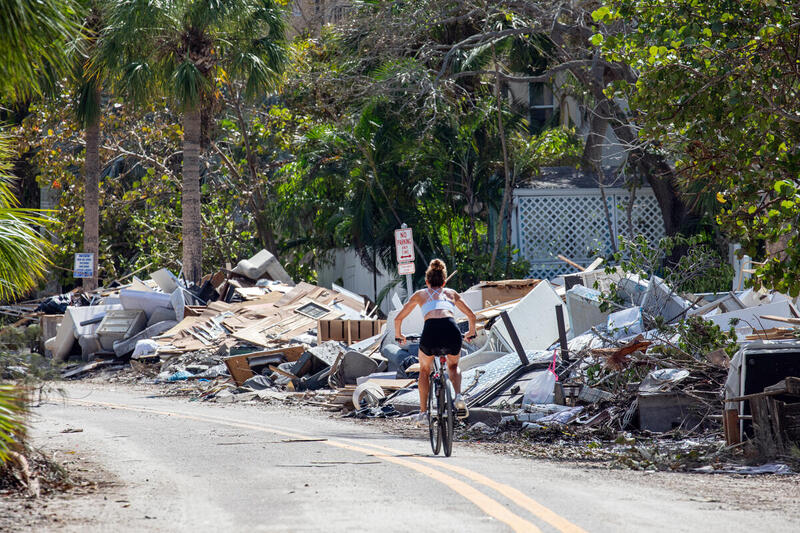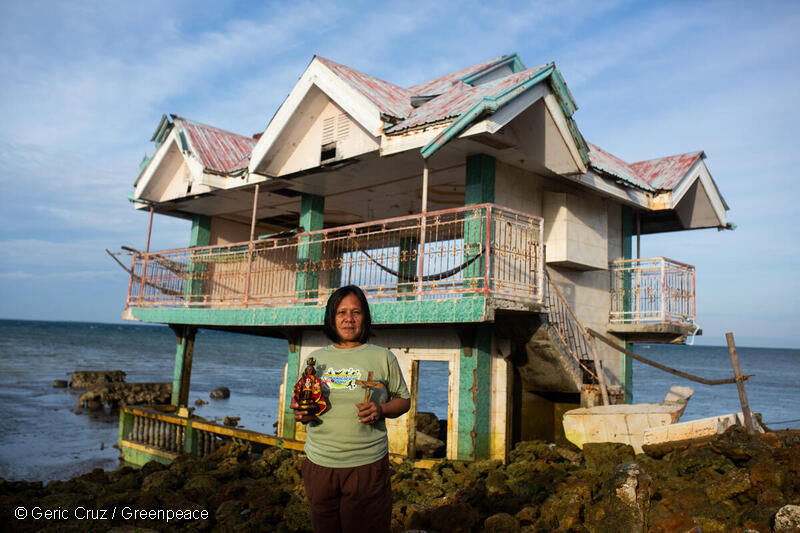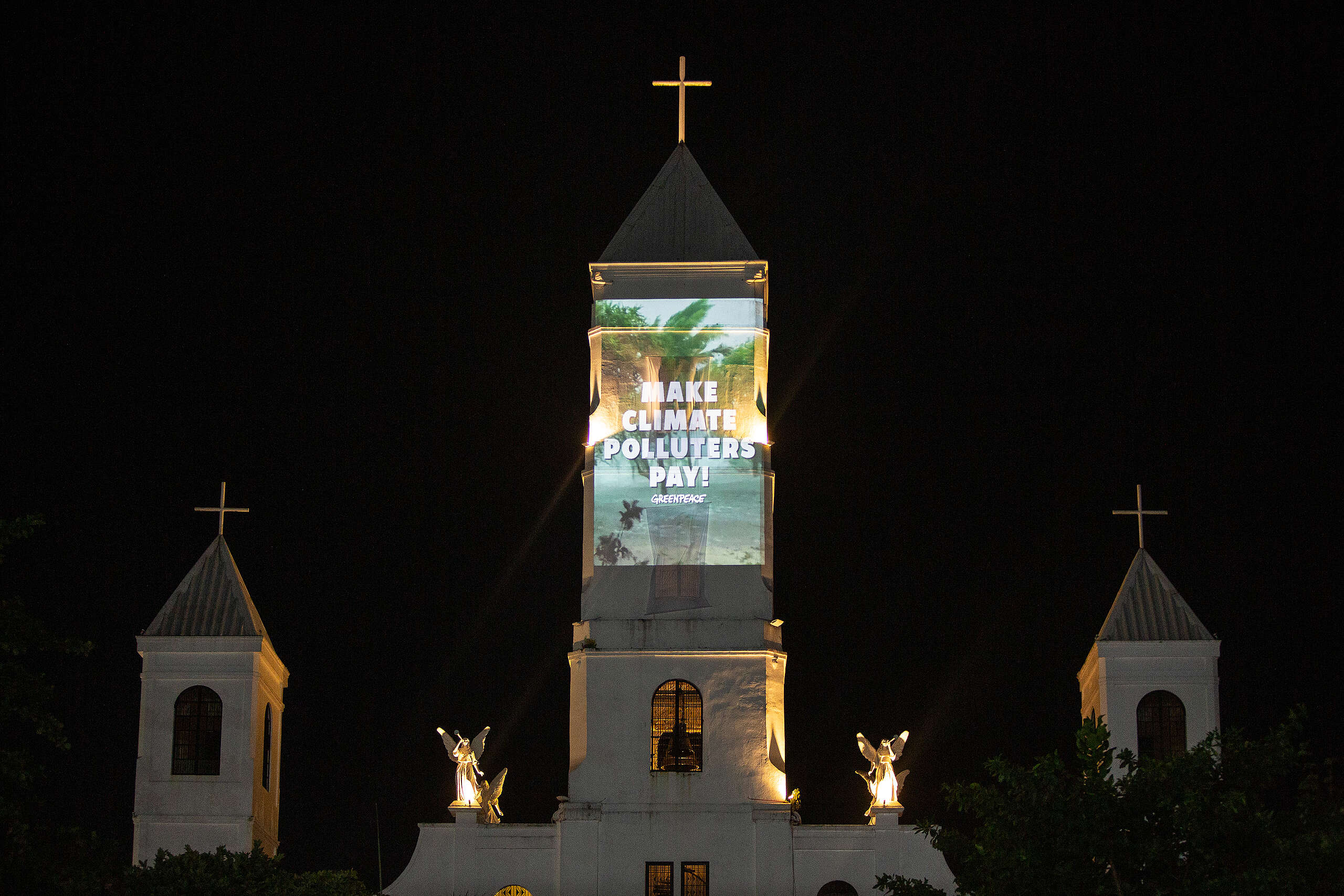QUEZON CITY, (06 October 2022)—Greenpeace Philippines today called out President Ferdinand Marcos Jr. for his climate doublespeak during his first three months in office. The call came days before Marcos Jr. marked his administration’s first 100 days. The environment group noted that none of the president’s climate rhetoric has translated into meaningful action so far, belying his claims that climate action and climate justice is his priority.
“If Greenpeace were to grade Mr. Marcos Jr.’s performance on climate in his first 100 days, he gets failing marks,” said Greenpeace Philippines country director Lea Guerrero. “Just empty and misleading promises. All talk but zero action. We haven’t even seen a shadow of a climate plan, or even a hint of an actual directive.”
“Meanwhile, on his stance on energy, we see a gross contradiction,” she added. “He used renewable energy when he ran for president, and continues to talk about it like he means it, but it’s all a game of pretend. If you look at his actions, he’s actually out to promote nuclear energy and fossil gas–both of which will block major RE development. Greenpeace believes this is climate hypocrisy at its most dangerous.”
The first 100 days of a new president serves as a litmus test on what their administration would be like over the course of their term. It sets the tone on what the government would focus on, policies to prioritize, the direction it is leading the country to, and how it would handle pressing national issues that affect the lives of millions of Filipinos.
In a paper also released today, Greenpeace assessed the president’s pronouncements against his actual policies and directives. The group said that while the president’s speeches may serve to project that he has a heightened awareness of the urgency of climate issues and its current and potential impacts to the economy as well as food and energy security, and that he’s doing something about it, his actions on the ground are either missing or in contradiction to his statements.
In particular the group cited:
- Lack of a holistic climate action strategy. In the President’s most public speeches, he refers to the climate crisis as a priority issue of the government. But this has not translated into meaningful action. The government still has no overarching coherent climate plan that should steer the work of all government agencies to address this crisis.
- No energy transition plan. The President used renewable energy to build his image as a supporter of sustainability during his campaign, and he continues to purport to support RE. But in reality, his policy direction on energy fully contradicts his rhetoric on RE.
- Disaster resilience also figures prominently in his speeches, but his stance on the subject remains unclear, whether he believes disaster resilience is merely a response, or whether it should have a policy framework.
- In legislation, only two of his 19 identified priority bills during the SONA are concerned with the climate. At the same time, some of his pet bills will block RE development.
- On budgets, while the increase in climate related expenditure for national government institutions (NGIs) in the 2023 budget may be positive, this is not an indication that there is a climate action plan behind the spending. We also note the decrease in the budget of climate-related implementing agencies, particularly the Climate Change Commission, as well as the Department of Environment and Natural Resources (DENR).
- On appointments, many pro-climate groups welcomed Antonia Yulo-Loyzaga as DENR Secretary, and her announcement to involve civil society organizations. We have yet to see whether this will be a DENR that will put people and the planet before big business.
- From the President’s pronouncements and actions, human rights and strengthening democratic processes and institutions does not seem to be a priority. Further, the administration has been mum about the Commission on Human Rights’ Report on the National Inquiry on Climate Change–a globally significant report on corporate accountability on climate–which should be actively used by the Philippine government as a basis for its demands on climate justice.
“It was good that he appointed a climate advocate, Maria Antonia Yulo-Loyzaga, as secretary of the Department of Environment and Natural Resources, but she would still need a clear directive from the president. And while there was an increase in climate-related expenditure for national government institutions, this is actually merely an exercise in budget tagging, rather than climate action planning,” Guerrero said. “There’s also a notable decrease in the budget of climate-related implementing agencies, particularly the Climate Change Commission, which the president himself heads. It’s obvious that there is a disconnect between the president’s climate pronouncements and actual policies being implemented on the ground.”
Greenpeace is calling on President Marcos Jr to:
- Ensure the Climate Emergency Declaration is followed through with a coherent climate plan. The government must institute climate action as the central policy of the state, and must protect people and climate on the basis of climate justice. Climate action must also be at the heart of the country’s COVID recovery plan.
- Climate action and climate justice must be mainstreamed across all local and national government policies and programs (for example in city planning, infrastructure projects, permits for large-scale industrial activities, and fisheries and agricultural policies, among others)
- Plans for economic recovery from the impacts of the pandemic must build in climate action. The government must develop a green and just recovery plan that is grounded on climate justice
- Put in place coherent strategies beyond disaster response, and these should also address long term vulnerabilities, not just disasters.
- Institute a rapid and just transition to a low-carbon pathway through a massive uptake of renewable energy solutions.
- Mandate businesses to align with the 1.5 commitment in the Paris Agreement, and must be mandated to bring their operations in line with the science to address the human rights impacts of climate change.
- Fully implement and strengthen the country’s environmental policies because ensuring a healthy environment is one of the best ways to mitigate climate impacts on communities.
- Uphold human rights and democratic institutions and processes. Environmental and rights defenders must be supported and protected.
###
For more information
Kat Eusebio-Santillan, Digital Campaigner
Greenpeace Philippines | [email protected] | +63 9992296451
Eunille Santos, Digital Campaigner
Greenpeace Philippines | [email protected] | +63 9175411248
Report: 100 Days of Climate Doublespeak
The missing climate agenda in the Marcos Jr administration



